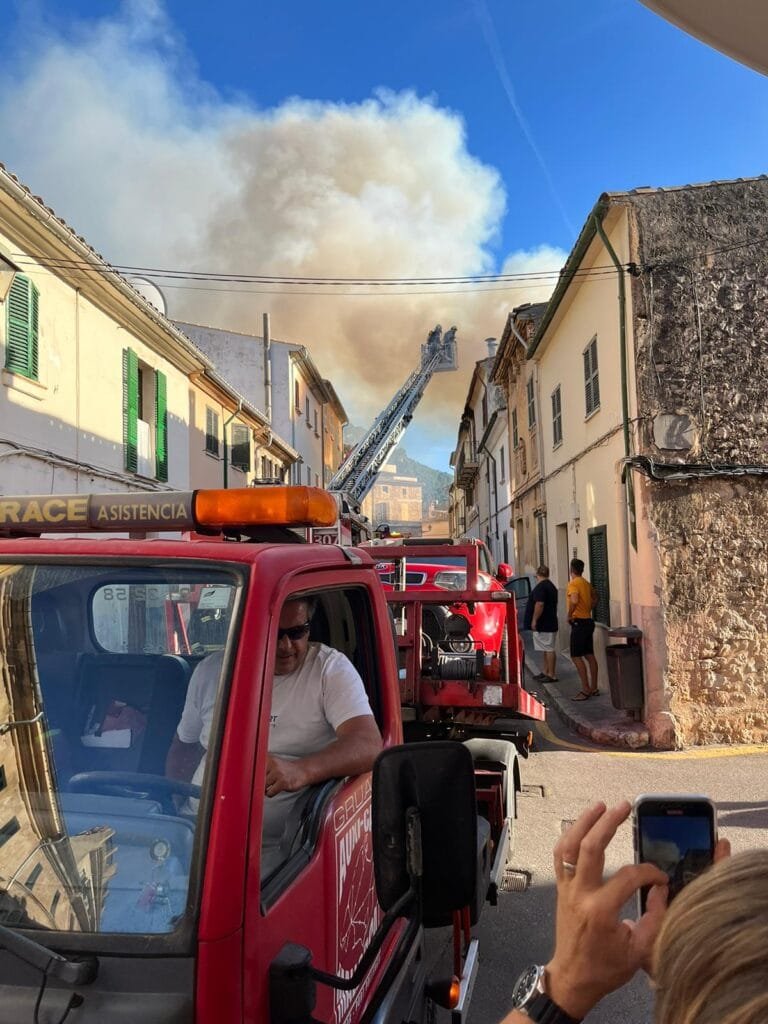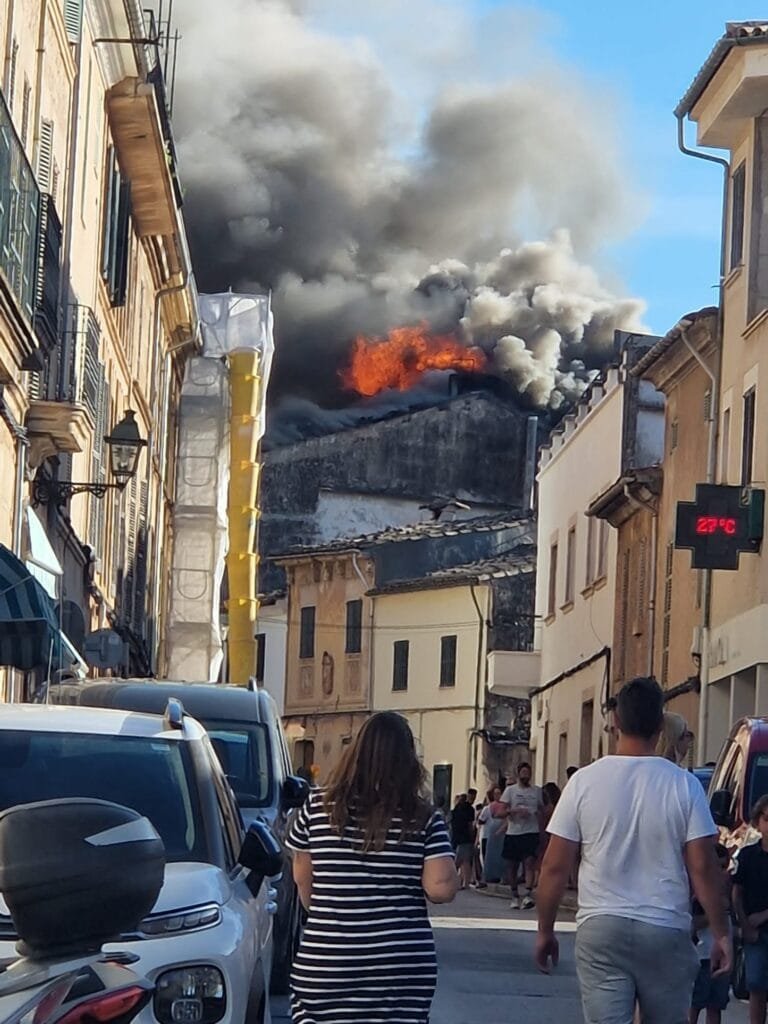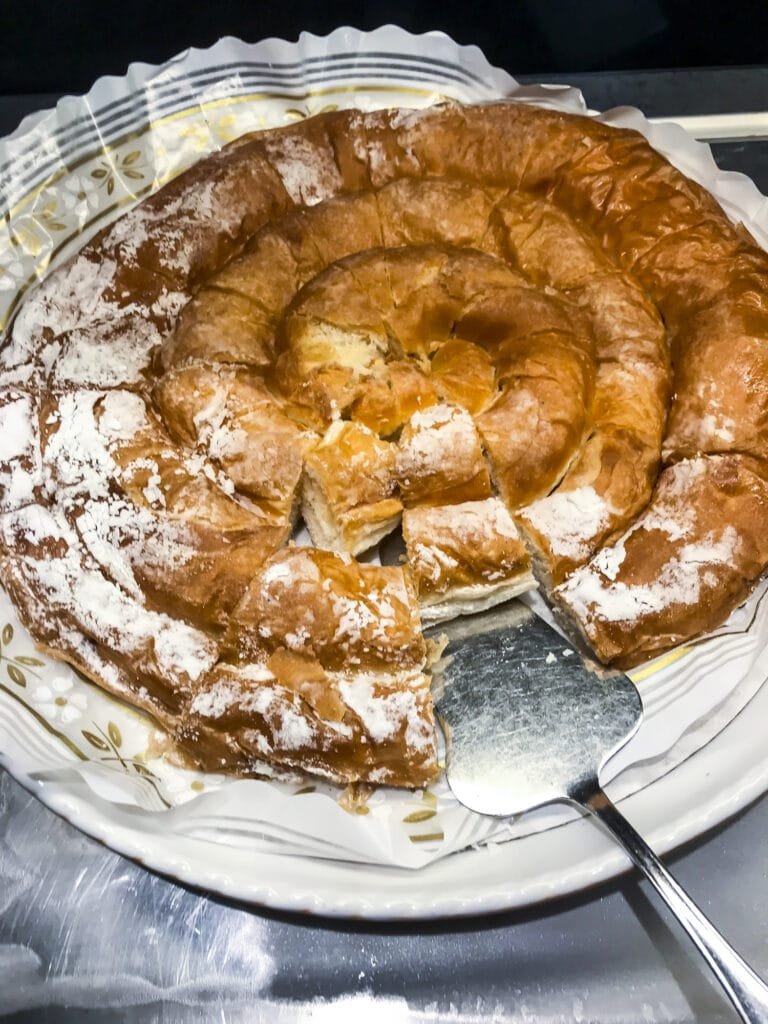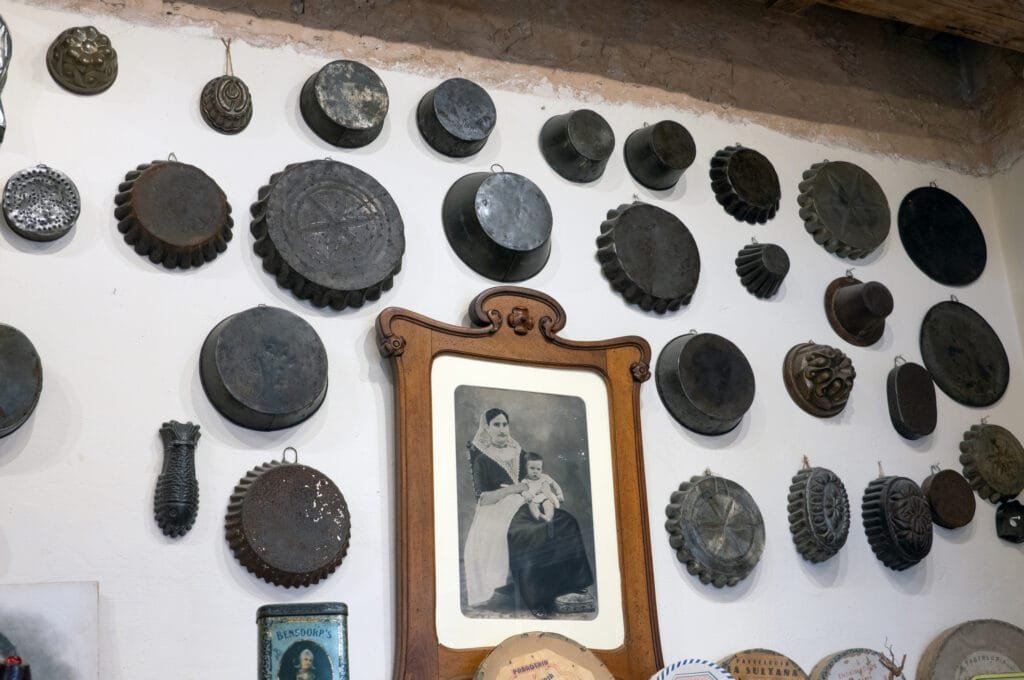Leure en versió original catalana
On September 24, at 5 pm, a fire breaks out on the first floor of a house in the town of Pollensa. Firefighters from adjacent towns, such as Alcúdia or Inca, come to try to hold back the fire, and just before eight in the evening it is already under control. However, they’ve arrived too late, and the house collapses.
At first glance, it seems a tragic event, and it is, but nothing out of the ordinary. After all, it’s common for a house to burn down every now and then. And how is it that the entire town was already aware of the catastrophe within a matter of minutes? On the ground floor there was a bakery, the Forn de Can Xim.


Photos courtesy of Som Pollença; Original article: “Impactant incendi a Can Xim”
What Is Can Xim?
The Can Xim bakery is one of the most historic in Pollensa. It has been in its current location, Carrer de la Mar 11, since the 1960s, though it was previously located on Carrer Torres. At the current location of the bakery, there was once a theater, the Teatre Novedades, until the legendary bakery under discussion occupied the building in the 1960s. But there are bakeries, or at least there were, by the thousands, right?

It is true that it was not the only bakery in town. There have always been a large number of bakeries in operation in Pollensa. However, nowadays we can no longer point to as many, and they are becoming ever fewer. Right now there are three left: Can Rabassó, Can Bisquerra and Forn el Moli. Yet even their days seem numbered, and you may soon find that the only places left to buy bread are the supermarkets, the Pa Nord cafe and gas stations.
We can’t talk about Can Xim as merely a bakery. Over time the business took root in the community until it became a local hub of community. Gradually it transcended the simple act of baking into, for me and many other people, a singular place, with its own essence. Almost all of us from Pollensa know the pizzas made there, almost always for birthday parties where they were the first food to be finished. I also remember going on the morning of January 17th to buy a “pepito” to eat in Ternelles.
But above all, the memory that will always accompany the name of Can Xim is of their palmeres. I went with my father to pick up bread for lunch, and on one side there was candy that didn’t interest me. I went to the cashier and saw the palmeres behind the glass. It always ended the same way: we’d buy normal palmeres as well as white chocolate and milk chocolate ones. We’d get home, and the first thing we’d do was eat them as a whole family.
Can Xim was no longer a for-profit enterprise like a supermarket—it was itself. It seemed that it had always been and would always be there, motionless in time. This article is not just about a bakery and how important it was for a town and also for me. It is about the bakeries, bars, restaurants, tailors and all the spaces we share that in the end become our own. How the locals, whom we name as if they were people, disappear forever. The fire went out at Can Xim, but it had been in trouble for some time. The burning merely brought about the inevitable in the form of catastrophe.
The Bakery Crisis
Mallorcan bakeries have had a big problem for some time—Pollença perfectly exemplifies it—generational change. The lack of young people wanting to be bakers might mean the end of traditional bakeries.

With the industry’s disappearance, we not only lose local institutions but also local products. All bakeries produce more than simply bread, of course. And here’s the question, who will make the Pollençan formatjades if there are no bakeries left? Supermarkets and much less gas stations aren’t going to produce items of such a marked cultural character.
In this sense, bakeries from all over the island preserve tradition in their culinary repertoire. When we present a nation, we usually define it with various cultural concepts such as the language or the history of the people. Yet when we go on a trip we almost never know the language and only explore its history to a shallow extent; what we do every day is eat.
The cuisine is the most forgotten aspect when it comes to telling us what a town is, even if it is the easiest to understand. Dishes from a particular place narrate what the climate is like, what plants and animals are there, the relationship between the food and beliefs of the area and even the historical hardships that have shaped the food.
For example, as trivial as it may seem at first glance, it used to be more common to make a cross on a loaf of bread whose side could never rest against the table as it represented the cross of Christ. One day I was bringing a loaf of bread home and, without any thought on my part, I left it on the table upside down and my father immediately turned it over out of habit. I didn’t understand why he did it, but he explained to me that his godmother always made him set the bread down “well.” This small custom already tells us a major fact: that we are in a land where Christianity is important enough to affect daily customs.
Towns and Their Spaces
A town is not only made up of history, traditions and the official language, but also current events, beliefs, dialects and slang. A town is more than the sum of its parts of community, history and language. Without each of these foundations, the town loses its strength.

When an individual moves to a new area, his internalized culture weakens because he doesn’t fit in. Over time he abandons it for the native culture. The lack of verbal and cultural communication prevents an isolated individual from the possibility of connecting socially.
Considering these two ideas, the businesses and locales of our day to day are the expression of culture in everyday life. The history and traditions that seem detached from us materialize in our behavior and speech as long as we remain within the same culture. We use dialects and clichés that are the construct of a common history.
In 1808, Napoleon Bonaparte’s France invaded the Iberian Peninsula, and the Spanish War of Independence began, but is that really true? The Balearic Islands did not enter the conflict, and to us, it seems very remote. That said, the Balearic economy benefited from the war, became more important in trade and received many wealthy migrants from the peninsula.
That is why we do not see it as a war of liberation but as a foreign war, the “French War” as it is popularly known in the islands. For many years in schools, it has been taught as “The War of Independence,” following the educational curriculum under Francoism that aimed to promote the patriotic spirit. Yet the local perception of the war is preserved thanks to the fact that the aforementioned community spaces unite us and allow us to preserve this particular name among many other things.
In contrast, there are the large corporations. They opt for an ambiguous and depersonalized minimalism that doesn’t make anyone fall in love or displeased either. It goes unnoticed. The space is sterile of any culture, perfect for mass production and the maximum clientele of people from all over the world. It causes a loss of local vocabulary and ideas, replacing them with foreign ones in the land they are from. In these “non-places,” unique perceptions like that of the French War cannot flourish.
The Community of the Future
So what does the future entail? We can’t predict it with certainty, but it doesn’t look good. Large companies increasingly gain ground, often those of poor quality. These create competition that small and medium businesses can’t match.
Plus, in the 21st Century, it’s worth mentioning the delocalization of shopping. Indeed, it is no longer even necessary to go shopping. The internet makes it possible to make all kinds of purchases without leaving home, obviating hiring cashiers and building establishments. All you need is a place to store your product and delivery personnel. Due to the COVID-19 pandemic, online shopping is more common than ever.
As the singer-songwriter Raimon says in “Jo vinc d’un silence,” (“Whoever loses his origins loses identity,“) but what are origins worth when there is no possibility of expressing them? As with Latin, culture will remain dead, reserved for cults and historians. The common spaces mentioned, exemplified by the Can Xim bakery, are becoming lost and with them the culture. Disuse, loss and death are repeated. Globalization does not stop and will leave people in oblivion, trapped in the magnitude of history—food, languages, festivals and community spaces that we lose forever.
A Change in Perspective
Such a complex situation cannot be solved with a big, bright idea, and anyone who says otherwise is either naïve or lying. We need joint social action, state and society in sync, where our businesses are promoted, not just the sun and the sea.

In Mallorca, tourism simultaneously represents a boon and a misfortune. The tourist must be aware of where he is, otherwise he will spend his money at large multinationals and so-called non-places, spaces where the individual does not develop any feelings towards them. These, as I mentioned before, create a lot of competition for small venues. It affects both business and the tourist, and the latter does not enjoy anything new and loses everything a town has to offer. It must not be the tourist who changes the business. Rather, the tourist himself must change. A cathartic effect must be produced on the part of the visitor where he learns and grows as a person.
Our job as residents is to defend our spaces and promote them. There are beaches and good weather all over the world, so we need to differentiate ourselves by what makes us different. Traditions, culture, language and food must be the standard. It is what makes Mallorca unique and irreplaceable.
